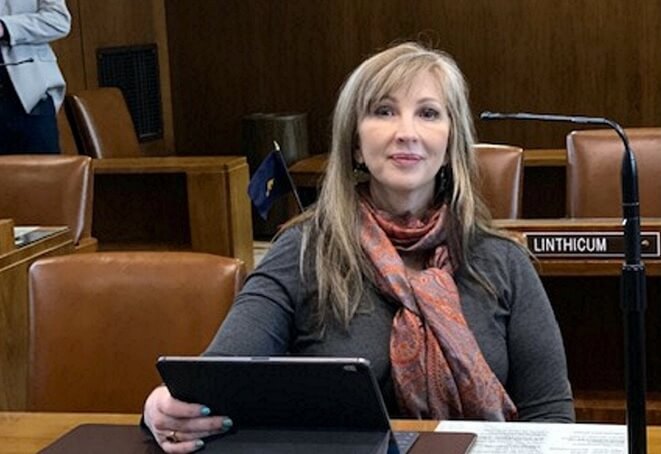By Oregon State Senator Kim Thatcher,
As the 2025 legislative session comes to a close, I want to thank you for taking the time—despite your busy lives—to stay interested and informed about what’s happening in Salem. Serving in a super minority means the road is steep—but that doesn’t stop us from trying to climb it. This session, I promoted transparency, fiscal responsibility, and policies that support—not punish—Oregon’s families, small businesses, and taxpayers.
In this newsletter, I’ll walk you through what was accomplished, what my political friends and I pushed for, and what we’re up against. Because the truth is, Oregon deserves better—and needs participation from people who don’t vote because they think it doesn’t matter. It does. And we all live with the consequences.
The Uphill: What We Fought For
Even in the minority, we introduced and supported legislation that would have made Oregon more affordable, more accountable, and more just for the people who’ve earned it most. Highlights include:
SB 385A – Would have created consequences for knowingly filing false child abuse reports, protecting families from weaponized accusations. It passed the Senate Judiciary committee and Senate floor without a single no vote. It died in House Judiciary without explanation.
SB 387 – A long-overdue update to Oregon’s property tax exemption for 100% disabled veterans. When first implemented, the exemption nearly covered the full value of a modest home. Today, it barely scratches the surface. This bill would have raised the exemption to $150,000 for fully disabled veterans and created a 90% exemption for those deemed unemployable. It unanimously passed the Senate Veterans, Emergency Management, Federal and World Affairs. However, once again, it stalled—while millions are spent on programs for people who aren’t even here legally.
SB 1006 – Would have required that only legislators or committees can introduce bills—not unelected bureaucrats or state agencies. A simple fix to restore legislative accountability.
SB 1007 – Streamlined the process for wrongfully incarcerated Oregonians to receive compensation and a formal finding of innocence. Senator Thatcher co-chief sponsored this bill to ensure justice doesn’t stop when the state realizes it made a mistake. Oregon needs to help restore the individual that did the time without committing the crime.
SB 1158 – Recognized gold and silver as legal tender in Oregon and exempted their exchange from certain taxes. A bold step toward financial sovereignty and inflation protection. It was granted a hearing but died without further action.
The Roadblock: What Could’ve Been
Despite bipartisan support or public demand, several common-sense reforms were blocked or ignored. These include:
SB 1006 – Legislative Accountability Reform. Our bill requiring named sponsorship for all introduced legislation received a hearing but was denied a work session—despite bipartisan support. I’ll be bringing it back as a priority bill in 2026.
SB 1123 – Permitting Reform. Efforts to streamline Oregon’s permitting process to help small businesses and homeowners was met with resistance, despite widespread support.
SB 539 – Tax Relief Proposal. Modest attempts to roll back increases or provide offsets for working Oregonians and small business owners gained no traction in Ways & Means.
SB 1007 – Compensation for the wrongfully convicted. This bill would have ensured that Oregonians who were incarcerated and later exonerated receive both financial compensation and a formal declaration of innocence. I co-chief sponsored this bill because justice doesn’t stop at release—it requires restoration. But the Legislature failed to fund it. And if the Legislature won’t fund it, justice isn’t served—it’s just words on paper.
The Detour: What We’re Up Against
Unfortunately, some policies passed this session will set Oregon further back—especially for our job creators and housing sector.
 SB 916 – Unemployment Benefits for Striking Workers
SB 916 – Unemployment Benefits for Striking Workers
This bill, which passed both chambers and now awaits the Governor’s signature, allows public and private employees to collect unemployment benefits while on strike—a move that many believe:
Undermines the very purpose of striking (which carries personal economic risk)
Adds pressure to Oregon’s $6.4 billion Unemployment Insurance Trust Fund
Encourages longer and more frequent walkouts
This sets a ridiculous precedent for Oregon’s fiscal sustainability and economic reliability.
 SB 426 – General Contractor and Property Owner Liability
SB 426 – General Contractor and Property Owner Liability
Now signed into law, this bill:
Holds general contractors and even property owners liable if subcontractors fail to pay their workers
Creates a “rebuttable presumption” that all laborers are employees unless proven otherwise
Offers no exemption even if the contractor has already paid the subcontractor in full.
This is a shocking shift in responsibility for those who follow the rules—while those who don’t are rewarded with a second check from someone else’s pocket
The subcontractors who most often fail to pay their workers are labor contractors who are not required to register with the Construction Contractors Board (CCB)
I introduced SB 1200, which would require labor contractors working on construction projects to register with the CCB—opening up avenues of redress through administrative law when there are complaints of wrongdoing.
The post Sen. Thatcher: 2025 Legislative re-cap first appeared on Oregon Catalyst.
Click this link for the original source of this article.
Author: In the news
This content is courtesy of, and owned and copyrighted by, https://oregoncatalyst.com and its author. This content is made available by use of the public RSS feed offered by the host site and is used for educational purposes only. If you are the author or represent the host site and would like this content removed now and in the future, please contact USSANews.com using the email address in the Contact page found in the website menu.








